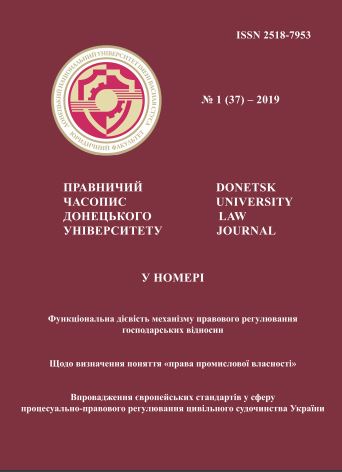Signs of beneficiary subjects of the stimulation of the alternative energy production.
DOI:
https://doi.org/10.31558/2518-7953.2019.1.9Keywords:
alternative energy sources, the production of the energy from alternative sources, subjects of the stimulation of the alternative energy production, legal status of the economic entities, beneficiary subjects of the stimulation of the alternative energyAbstract
The research is devoted to the characteristics of the beneficiary subjects of the stimulation of the alternative energy production. The purpose of the given research is to specificate the characteristics of the beneficiary subjects of the stimulation of the alternative energy production. The key Ukrainian energy laws, such as the law On Alternative Energy Sources, On the Electricity Market and On Heat Supply, as well as the scientific researches on this issue were explored.
According to the legal definition of energy, produced of alternative energy sources, it is considered as electricity, heat and mechanical energy, that is produced on the objects of alternative energy and may be considered as goods for purchase and sale operations. However, it was found that beneficiary subjects of the stimulation of the production of the electricity from alternative sources are economic entities and consumers of energy, which produce electricity from alternative energy sources. The list of beneficiary subjects of the stimulation of production of the heat energy are shorter, comparing to the list of electricity producers, and includes only economic entities, which produce heat energy from alternative energy sources. Finally, having based on existing legal framework it seems to be impossible to find out what is the producer of mechanical energy from alternative energy sources in terms of law. Given the above, the producers of mechanical energy from alternative energy sources are not considered as a beneficiary subjects of the stimulation of the alternative energy production.
According to the characteristics of the economic entities, who produce energy from alternative sources, it was found some peculiarities of the attributable to all economic entities characteristics In the light of the above, the characteristics of the beneficiary subjects of the stimulation of the production of energy from alternative sources have been specificated and presented.
The theoretical results of the given research can be used in legal theory and also in further theoretical researches devoted to the stimulation of the alternative energy production.
References
Інформація щодо потужності та обсягів виробництва електроенергії об’єктами відновлюваної електроенергетики, яким встановлено «зелений» тариф (станом на 01.01.2019). URL: http://saee.gov.ua/sites/default/files/4_2018.pdf (дата звернення: 18.06.2019).
Про альтернативні джерела енергії: Закон України від 20 лютого 2003 р. № 555-IV. Відомості Верховної Ради України. 2003. № 24. Ст. 155.
Про ринок електричної енергії: Закон України від 13 квітня 2017 р. № 2019-VIII. Відомості Верховної Ради України. 2017. № 27–28. Ст. 312.
Про теплопостачання: Закон України Закон України від 2 червня 2005 р. № 2633-IV. Відомості Верховної Ради України. 2005. № 28. Ст. 373.
Господарське право: Практикум / А. Г. Бобкова (кер. авт. кол.), Ю. О. Моісєєв, Ю. М. Павлюченко та ін.; за заг. ред. А. Г. Бобкової. Харків: Право, 2018. 592 с.
Хозяйственный кодекс Украины: Научно-практический комментарий / Под общ. ред. А. Г. Бобковой. Харьков: Издатель ФЛ-П Вапнярчук НН, 2008. 1296 с.
Інформація про об’єкти альтернативної енергетики, яким встановлено «зелений» тариф (станом на 01.01.2019). URL: http://www.nerc.gov.ua/data/filearch/elektro/energo_pidpryemstva/stat_info_zelenyi_taryf/2018/stat_zelenyi-taryf.12-2018.pdf (дата звернення: 18.06.2019).
Стимулювання відновлюваної енергетики в Україні за допомогою «зеленого» тарифу: посібник для інвесторів. Міжнародна фінансова корпорація IFC. Київ, 2012. 80 с. URL: http://saee.gov.ua/documents/green-tariff.pdf (дата звернення: 18.06.2019).
Перелік суб’єктів господарювання, які отримали ліцензії на право провадження господарської діяльності з виробництва теплової енергії на установках з використанням нетрадиційних або поновлюваних джерел енергії та ліцензійні справи яких передано НКРЕКП до обласних, Київської міської державних адміністрацій, які на сьогодні є органом ліцензування та уповноважені здійснювати контроль за додержанням ними Ліцензійних умов. Офіційний вебсайт Національної комісії, що здійснює державне регулювання у сферах енергетики та комунальних послуг. URL: http://www.nerc.gov.ua/data/filearch/litsenziini_reestry/perelik_teplo_vyrob_ ponovl_peredani_obl.pdf (дата звернення: 18.06.2019).
Мельник Л. Г. Економіка енергетики: підручник / За ред.: Л. Г. Мельника, І. М. Сотник. Суми: Університетська книга, 2015. 378 с.
Звіт про результати стимулювання та використання енергії, виробленої з відновлюваних джерел, в Україні за 2016–2017 рр. URL: http://saee.gov.ua/sites/default/files/2016-2017.pdf (дата звернення: 18.06.2019).
Рощина Н. В., Борданова Л. С. Аналіз процесу впровадження систем виробництва сонячної енергії для приватних домогосподарств в Україні. Інвестиції: практика та досвід. 2018. № 19. С. 24–27.
Кізима Т. Домогосподарства як елемент економічної системи: сутність, еволюція та функції в умовах ринку. Вісник Тернопільського національного економічного університету. 2008. № 3. С. 22–36.
Федоренко В. Г., Діденко О. М., Руженський М. М., Іткін О. Ф. Політична економія: Підручник / За наук. ред. д-ра екон. наук, проф. В. Г. Федоренка. К.: Алерта, 2008. 478 с.
Климчук М. Підприємства альтернативної енергетики: особливості формування бізнес-процесів. Економічний вісник НТУУ «КПІ»: збірник наукових праць. 2011. № 8. С. 39–45.
Енергетична галузь України: підсумки 2016 року. Центр Разумкова, 2017. 163 с. URL: http://razumkov.org.ua/uploads/article/2017_ENERGY-FINAL.pdf (дата звернення: 18.06.2019).
Калетнік Г. М., Козак К. В. Зелений бізнес – перспектива підприємництва. Економіка. Фінанси. Менеджмент: актуальні питання науки і практики. 2016. № 12. С. 7–15.

